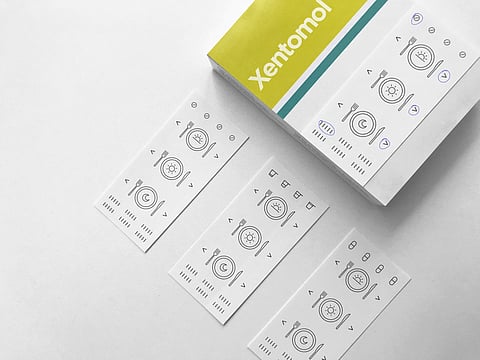Stickers prevent accidental overdose
Easy-to-understand pictorials on medication address illiteracy and language barriers

Dubai Health Authority (DHA) launched a pioneering initiative aimed at reducing the risk of overdose among blue-collar workers in the emirate. The initiative addresses the issue of illiteracy and language barrier, which can confuse blue-collar workers increasing their risk of an overdose.
The solution comes in the form of a simple pictorial prescription sticker, which pharmacies and government hospitals have been encouraged to place on workers’ medication packaging.
Called RX Prescription Stickers, they indicate through clear images all the key instructions including the frequency and time of consumption as well as the duration of the course. Common and basic symbols have been used to ensure foolproof comprehension.
Ease of use
“The risk of overdose among people who can’t read or understand an alien language has been high, so we are delighted to be introducing this solution, which is simple but highly effective,” said Dr Ali Al Sayed, Director of Pharmaceutical Services Department at DHA.
“The initiative’s success is partly due to the fact that pharmacies and dispensing hospital departments find the sticker system quick and easy to use. Patients can now be reassured that they are taking the right dosage at the right time and for the correct period.
“We are very encouraged by the results so far — there have been no reported overdoses since the system came into practice.”
The pilot project, which involved the authority working with a range of pharmacies and government hospitals over a two-month period, has been so successful that there are now plans to introduce it across the nation.
There are currently about 75,000 blue-collar workers in Dubai, with a vast majority coming from rural areas around the region and the Asian subcontinent, especially India, Pakistan, Nepal and Bangladesh.
Pilot phase
While all workers are provided with healthcare benefits in Dubai as part of the mandatory health insurance scheme, there is no special prescription system for those who have trouble reading or understanding a different language.
Therefore, medications have traditionally been consumed based on what was conveyed verbally or through handwritten indications.
Several key pharmacies frequented by blue-collar workers piloted the project, with the feedback, response and effectiveness monitored over a two-month period. The aim was to accommodate revision before the unique system became mandatory throughout Dubai.
The system is now being used at 247 registered pharmacies and government hospitals across the emirate.


